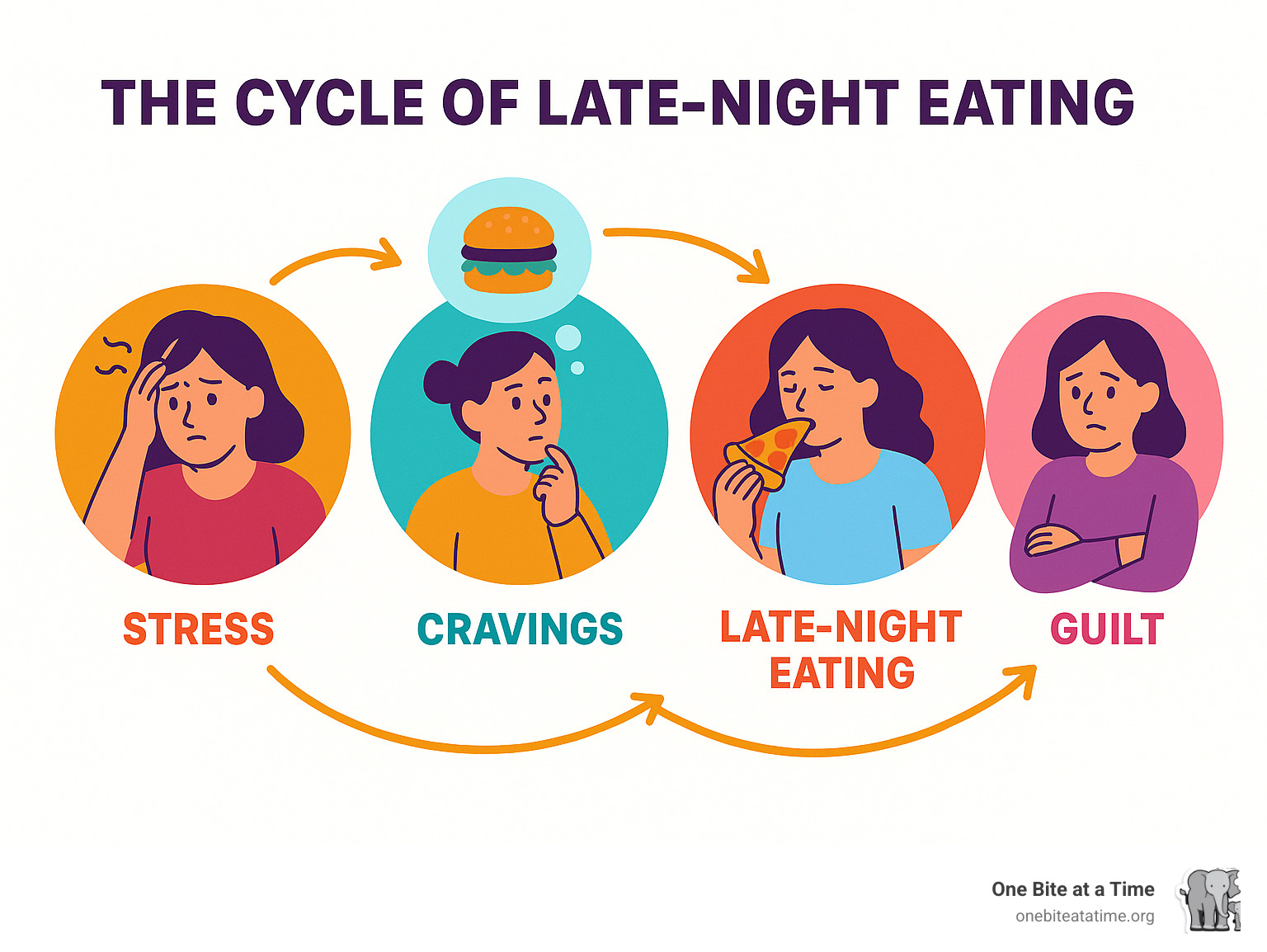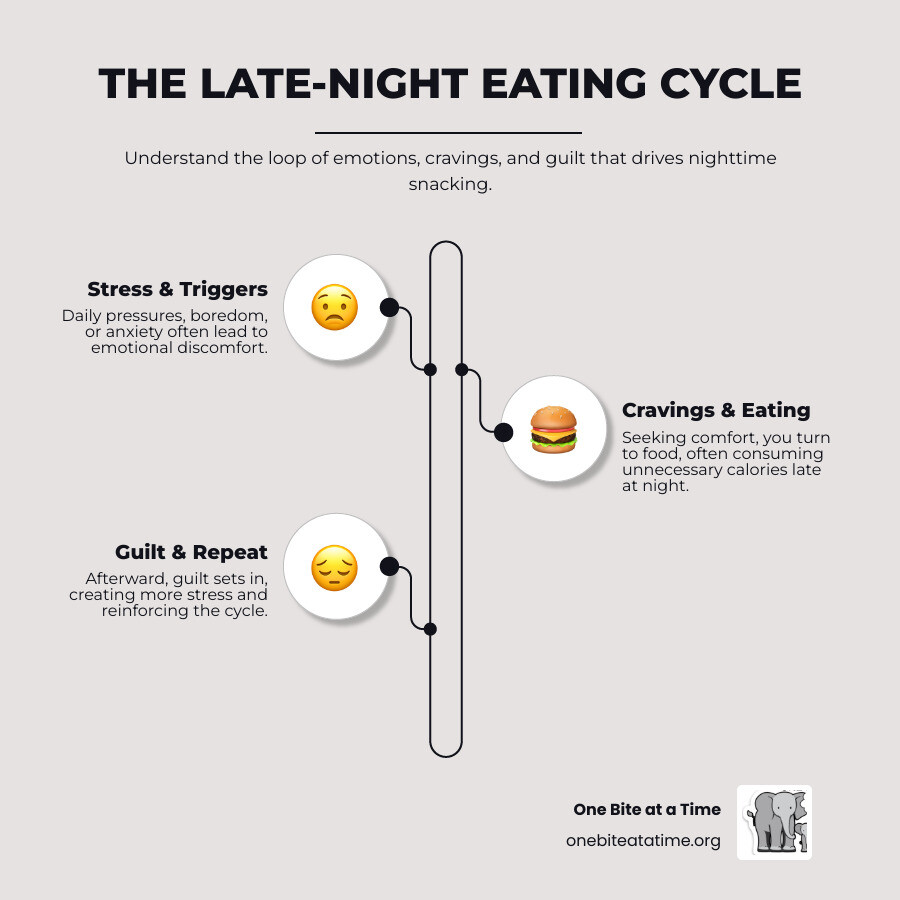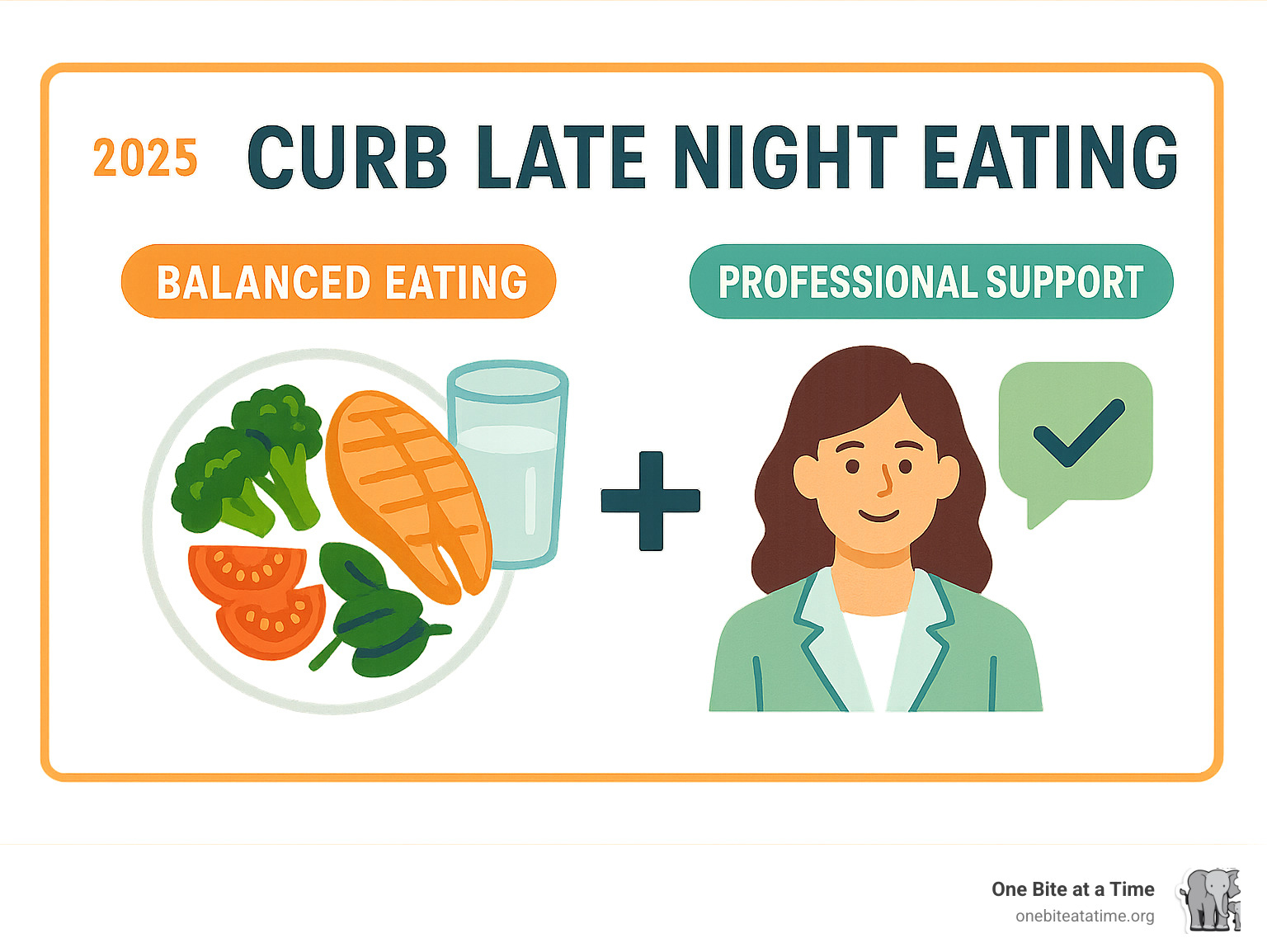Curb Late Night Eating: 10 Proven Tips
Understanding Your Nighttime Eating Habits
If you’re looking to curb late night eating, you’re definitely not alone. Many of us find ourselves reaching for snacks long after dinner, even when we’re not truly hungry. This habit can feel frustrating and hard to break.
Here’s a quick look at how you can start to address late-night eating:
- Eat balanced, satisfying meals during the day.
- Recognize what triggers your evening cravings (like boredom or stress).
- Make your environment less tempting by removing easy-to-grab junk food.
- Aim to stop eating a few hours before you go to bed.
- Prioritize getting enough good quality sleep each night.
This cycle of eating when you don’t need to can lead to extra calories and impact your health. It might leave you feeling tired, guilty, or stuck in a loop. But breaking free doesn’t mean strict diets or deprivation. Instead, it’s about understanding your habits and building new, lasting routines.
This article will help you uncover why late-night eating happens and offer practical ways to manage it. You can achieve better health and well-being, one mindful bite at a time.

Why Late-Night Eating Sabotages Your Health Goals
If you’ve ever felt frustrated with yourself for raiding the fridge at 10 PM, take a deep breath. Late-night eating isn’t just about willpower or personal weakness. There’s actually fascinating science behind why your body craves food at night, and understanding it can help you curb late night eating for good.
Let’s explore what’s really happening in your body when those evening cravings hit, and why this habit might be working against your health goals more than you realize.
The Science Behind Nighttime Cravings and Weight Gain
Your body runs on an internal clock called your circadian rhythm. Think of it as your personal 24-hour schedule that controls everything from when you feel sleepy to how your metabolism works. This rhythm evolved over thousands of years to help our ancestors survive – they needed to process food during daylight hours and conserve energy at night.
Here’s the thing: when you eat late at night, you’re basically fighting against this natural clock. Your body expects to wind down and store energy, not digest a bowl of cereal or leftover pizza.
Hormones play a huge role in this process. During the day, your body produces hormones like leptin (which tells you “I’m full”) and ghrelin (which says “I’m hungry”) in a predictable pattern. But when you eat off-schedule, these hormones get confused and stop working properly.
As evening approaches, your body also starts releasing melatonin to help you sleep. But melatonin has another job – it slows down insulin production. This means your body becomes less efficient at processing sugar and carbs at night, leading to blood sugar spikes and increased fat storage.
A groundbreaking Harvard study on late-night eating proved this isn’t just theory. Researchers found that people who ate later in the day experienced increased hunger, burned fewer calories, and stored more fat – even when eating the exact same foods. It’s not just about what you eat, but when you eat it.
Are You a Habitual Snacker or Is It Something More?
Most late-night eating falls into the “habit” category. Maybe you always grab something while watching TV, or you find yourself stress-eating after a long day. Common triggers include boredom, stress, anxiety, and simple routine – like automatically reaching for snacks during your favorite show.
These patterns are totally normal and very fixable once you recognize them. Ask yourself: Are you actually hungry when you eat at night, or are you responding to emotions or habits?
However, some people experience something more serious called Night Eating Syndrome (NES). This is a real medical condition where someone consumes more than 25% of their daily calories after dinner or wakes up multiple times to eat during the night. People with NES often don’t feel hungry for breakfast and may feel like they can’t sleep unless they’re full.
If your nighttime eating feels completely out of control, or if you’re regularly waking up to eat, it’s worth talking to a healthcare professional. You can learn more about the clinical aspects in this resource: What is Night Eating Syndrome?
Whether your late-night eating is habitual or more complex, emotional factors often play a big role. The quiet evening hours can amplify feelings of stress, loneliness, or anxiety, making food feel like a comforting friend. Learning to manage these emotions without turning to the kitchen is key to breaking the cycle. Our Stress Less, Eat Right: A Guide to Nutrition for Stress Management can help you understand this connection better.
The Health Consequences You Can’t Ignore
Here’s where things get serious. Regular late-night eating doesn’t just add a few pounds – it can significantly impact your overall health in ways you might not expect.

Weight gain is the most obvious consequence. Research shows that people who eat around 100 calories or more within two hours of bedtime are roughly 80% more likely to be overweight compared to those who don’t. That’s a significant increase in obesity risk just from timing alone.
But the problems go deeper than the scale. Regular nighttime snacking is linked to higher HbA1c levels – a key marker that indicates your risk for Type 2 diabetes. When you eat late, your blood sugar and fat levels spike more dramatically after meals the next day, creating a roller coaster effect that stresses your metabolism.
Sleep quality takes a major hit too. Eating within three hours of bedtime can worsen acid reflux and heartburn, making it uncomfortable to lie down. Even without digestive issues, late-night eating disrupts your sleep patterns.
This creates a vicious cycle that’s hard to break. Poor sleep increases ghrelin (your hunger hormone) and decreases leptin (your fullness hormone), leaving you hungrier and less satisfied the next day. You end up craving more food, especially high-calorie comfort foods, which leads to more late-night eating.
The good news? Understanding these consequences gives you the power to make different choices. When you realize that your 10 PM snack isn’t just affecting tomorrow’s weigh-in but potentially your long-term health, it becomes easier to find motivation for change.
For more insights on building healthy habits that support your overall wellbeing, check out our guide to Nutrition for Healthy Lifestyle.
10 Actionable Strategies to Curb Late Night Eating for Good
Now that we understand the “why” behind late-night eating, let’s dive into the practical “how.” Here are 10 actionable strategies we recommend to help you curb late night eating and reclaim your evenings. These tips focus on sustainable habit change, not restrictive diets.
1. Structure Your Day for Success
One of the best ways to prevent late-night hunger and cravings is to ensure you’re eating adequately and consistently throughout the day. Skipping meals, especially breakfast, can set you up for overeating later on. Research shows that breakfast eaters are less likely to be overweight or overeat later in the day.
We recommend establishing a routine with structured eating times and planning your meals and healthy snacks in advance. This helps avoid impulsive eating when hunger strikes. Consider “front-loading” your calories, meaning eating a more substantial breakfast and lunch. A 2019 study found that eating more calories in the morning could decrease your risk of developing overweight or obesity by nearly 50%. This approach aligns with your body’s natural circadian rhythm, making it easier to manage hunger signals as the day winds down. Maintaining a regular meal pattern is more important than meal frequency for appetite control. For more tips on managing your meals effectively, check out our insights on Healthy Eating Habits for Busy Executives.
2. Power Up with Protein and Fiber
When it comes to feeling full and satisfied, protein and fiber are your best friends. These nutrients promote satiety, meaning they help you feel full faster and stay full longer, reducing the likelihood of intense cravings later in the evening. A 2010 study found that high-protein meals reduced cravings by 60% and cut the desire to eat at night by 50% in males with overweight or obesity. That’s a significant impact!
We encourage you to include a source of protein at every meal and snack. The Academy of Nutrition and Dietetics suggests eating a variety of healthy, filling foods during the day to help reduce nighttime cravings. Aim for approximately 14 grams of dietary fiber for every 1,000 calories you consume.
Here are some high-protein, high-fiber snack ideas that can help keep you satisfied:
- Greek yogurt with berries and a sprinkle of chia seeds
- Apple slices with a tablespoon of natural nut butter
- A small handful of almonds or other mixed nuts
- Steamed edamame (in pods for added fiber and chewing satisfaction)
- Cottage cheese with a few whole-grain crackers
- Hard-boiled eggs
3. Master Your Mind and Mood to Curb Late Night Eating
Often, late-night eating isn’t about physical hunger but about emotional needs. Boredom, stress, anxiety, sadness, or even loneliness can trigger cravings. Recognizing these emotional eating patterns is a powerful step towards change. Before reaching for that snack, pause and ask yourself: Am I truly hungry, or am I feeling a different emotion?
We advocate for developing non-food coping mechanisms for stress and emotional distress. Practice de-stressing techniques like deep breathing exercises, meditation, gentle yoga, or a short walk. If you’re feeling bored, engage in an enjoyable activity that doesn’t involve food, like reading a book, listening to music, or pursuing a hobby. Finding ways to soothe yourself without food can significantly help to curb late night eating.
Seeking emotional support from friends, family, or a healthcare professional can also be incredibly helpful. Learning relaxation techniques and understanding the connection between your mental state and eating habits is vital for long-term success. For more guidance on this, explore our dedicated resource on Stress Management Through Nutrition.
4. Create a Craving-Proof Environment
“Out of sight, out of mind” is a powerful principle when it comes to late-night snacking. If tempting foods are easily accessible and visible, you’re much more likely to reach for them, even if you’re not hungry.

We recommend making your home a craving-proof zone. This means:
- Removing temptations: Don’t keep highly processed, high-sugar, or high-fat junk foods in your pantry or fridge. If they’re not there, you can’t eat them!
- Stocking healthy options: Instead, fill your kitchen with healthy, ready-to-eat options like fresh fruits, cut-up vegetables, plain Greek yogurt, and whole-grain crackers.
- Strategic placement: If you must have some less-healthy items for others in your household, store them in opaque containers, in high cupboards, or in less accessible areas.
- Hydration: Sometimes, what feels like hunger is actually thirst. Keep a water bottle handy and drink plenty of water throughout the day. If you feel a craving at night, try a cup or two of water first. Herbal tea can also be a soothing, non-caloric alternative that helps you feel full and passes the time.
By controlling your environment, you create a supportive space for your new habits. For more on making healthier choices, check out our insights on Reducing Processed Foods.
5. Hack Your Habits and Routines
Our habits often run on autopilot, especially in the evening. To curb late night eating, we need to disrupt these automatic behaviors and establish new, healthier routines.
One simple yet effective trick is to brush your teeth immediately after dinner. This acts as a psychological signal that the eating day is over. Plus, food often tastes less appealing after brushing!
Beyond that, intentionally create a non-food-focused evening routine. Instead of mindlessly grazing while watching TV, try:
- Reading a book or magazine
- Taking a warm bath or shower
- Engaging in a hobby like knitting, drawing, or journaling
- Listening to music or a podcast
- Spending quality time with family or friends without food as the focus
Crucially, prioritize sleep. Sleep deprivation can mess with your hunger hormones, making you feel hungrier and crave unhealthy foods. Aim for seven to nine hours of quality sleep each night. Going to bed earlier can also reduce the window of opportunity for late-night snacking. As the saying goes, “sleep is the poor man’s snack.”
6. Practice Mindful Eating and Distraction
Mindless eating, especially in front of screens, is a huge contributor to late-night snacking. We often eat without truly registering how much or even what we’re consuming. To curb late night eating, we need to bring awareness back to our eating habits.
When you feel the urge to snack at night, pause. Take a few deep breaths. Ask yourself, “Am I truly hungry, or is this boredom, stress, or just a habit?” If you decide to eat, do so mindfully. Sit down, put away distractions like your phone or TV, and savor each bite. Pay attention to the taste, texture, and how your body feels. This can help you feel satisfied with less and recognize fullness cues.
If you’re not truly hungry, try distracting yourself for 15-20 minutes with a non-food activity. Often, the craving will pass. This could be anything from a quick tidying session to calling a friend or doing a few stretches. The key is to break the immediate connection between the urge and the act of eating.
7. Plan Your Meals and Snacks
Failing to plan is planning to fail, especially when it comes to eating. If you don’t have a clear idea of what you’ll eat throughout the day, you’re more likely to grab whatever is convenient when hunger strikes, which often leads to unhealthy choices, particularly in the evening.
We encourage you to dedicate some time each week to meal planning. This includes not just your main meals but also healthy snacks. Ensure your meals are balanced and satisfying, providing enough protein, fiber, and healthy fats to keep you full. Don’t let yourself get overly hungry during the day, as this can trigger intense late-night cravings. Having a healthy snack planned for an hour or so after dinner can also be a helpful strategy if you typically get hungry again before bed. This proactive approach helps you stay in control and makes it easier to curb late night eating.
8. Set a “Kitchen Closed” Time
One of the most effective strategies for many people is to establish a strict “kitchen closed” time. This means no food consumption after a certain hour, typically 3-4 hours before your planned bedtime. For example, if you aim to be in bed by 10 p.m., make 7 p.m. your cutoff.
This approach provides a clear boundary and reduces decision fatigue. Instead of constantly battling cravings, you simply have a rule: “the kitchen is closed.” While the exact time might vary based on your schedule and individual needs, the consistency is key. This aligns with advice to finish your last meal several hours before bedtime to support healthy weight management and improve sleep quality.
9. Distinguish Between Hunger and Other Cues
Our bodies can sometimes send mixed signals. What feels like hunger might actually be thirst, fatigue, or an emotional need. Learning to decipher these cues is fundamental to effectively curb late night eating.
Before you grab a snack, ask yourself:
- Am I truly hungry? (Do I feel physical hunger pangs, or is my stomach rumbling?)
- Am I thirsty? (Sometimes dehydration mimics hunger.)
- Am I tired? (Sleep deprivation can increase hunger hormones.)
- Am I bored? (Do I just need something to do?)
- Am I sad, stressed, or anxious? (Am I seeking comfort?)
If you’re unsure, try drinking a large glass of water first. Wait 15-20 minutes. If the “hunger” subsides, it was likely thirst. If it’s an emotion, try one of the non-food coping mechanisms we discussed earlier. This mindful check-in helps you respond to your body’s true needs rather than falling into old habits.
10. Seek Professional Support When Needed
While these strategies are incredibly effective for many, we understand that for some, late-night eating can feel overwhelming and out of control. If you’ve tried various methods and still struggle, or if you suspect you might be dealing with an eating disorder like Night Eating Syndrome (NES) or Binge Eating Disorder (BED), please know that you are not alone and professional help is available.
We strongly recommend talking with a healthcare professional, registered dietitian, or mental health professional. They can help you identify underlying causes, rule out medical conditions, and develop a personalized treatment plan that’s right for you. This might include cognitive behavioral therapy (CBT), which has shown promise in managing eating disorders, or other forms of psychotherapy. There’s no shame in asking for help; it’s a sign of strength and a commitment to your well-being.

Frequently Asked Questions about Late-Night Eating
We understand that changing your nighttime eating habits can feel overwhelming, and you probably have specific questions about what works best. These are some of the most common concerns we hear from our clients, and we’re here to help you steer them with practical, realistic advice.
What is the best time to stop eating before bed?
There’s no magic hour that works for everyone, but we generally recommend stopping eating three to four hours before your typical bedtime. This gives your body enough time to digest your food properly, which can prevent uncomfortable issues like acid reflux and help you sleep better.
Think about it this way: your body is designed to process nutrients during the day when you’re active. When you align your eating window with your natural circadian rhythm—ideally within an 8 to 12-hour period during daylight hours—you’re working with your body instead of against it. This makes it much easier to curb late night eating naturally.
For example, if you usually go to bed at 10 p.m., try to finish dinner by 6 or 7 p.m. But remember, this is a guideline, not a strict rule. Listen to your body’s hunger and fullness cues first. Some people might need a slightly different timing based on their work schedule, medications, or individual metabolism.
What should I eat if I’m genuinely hungry at night?
Sometimes, despite your best efforts, real hunger happens late at night. Don’t ignore it—that will only set you up for overeating the next day. The key is choosing a small, nutrient-dense snack that combines protein and fiber. This combination helps you feel satisfied without overwhelming your digestive system or causing blood sugar spikes.
Plain yogurt with fruit is one of our favorite recommendations because it provides protein and a touch of natural sweetness. Vegetables with hummus give you that satisfying crunch plus protein and healthy fats. A small portion of nuts like almonds or walnuts offers protein, fiber, and healthy fats in a compact package.
If you want something more substantial, try whole-grain toast with almond butter—it provides complex carbohydrates, protein, and healthy fats that work together to keep you satisfied. An apple with peanut butter is another classic combination that hits all the right notes.
Avoid anything heavy, fatty, spicy, or loaded with sugar. These foods can upset your stomach and make it harder to fall asleep. The goal is to gently satisfy genuine hunger, not to have another full meal.
How can I curb late night eating when I’m stressed or bored?
This is probably the most common trigger we see with our clients here in Ohio and Pennsylvania. The first step is always acknowledging the emotion you’re feeling. Take a moment to ask yourself: “Am I actually hungry, or am I feeling stressed, bored, anxious, or sad?”
Once you’ve identified what’s really going on, create a pause before eating. This simple step can be incredibly powerful. Try engaging in a non-food activity for at least 15 minutes. You might take a short walk around the house, do some gentle stretches, or practice deep breathing exercises. Sometimes listening to calming music or calling a friend can shift your mood completely.
Drinking a glass of water or herbal tea is another great strategy. Chamomile or peppermint tea can be especially soothing, and the warm liquid helps fill your stomach while giving your hands and mouth something to do. Often, you’ll find that the urge to eat passes once you’ve addressed the underlying emotion.
The beautiful thing is that over time, you’ll naturally build new, healthier ways to cope with stress and boredom that don’t involve food. It takes practice, but it’s absolutely possible to break this cycle and feel more in control of your evenings.
Conclusion: Reclaim Your Nights and Your Health
Breaking free from late-night eating isn’t about willpower or perfect self-control—it’s about understanding yourself and building habits that actually stick. Throughout this journey together, we’ve uncovered why your body naturally craves food at night, explored the real health impacts, and most importantly, equipped you with practical strategies that work in real life.
The beauty of learning to curb late night eating lies not in restriction, but in creating a rhythm that feels natural and sustainable. When you structure your day with satisfying meals rich in protein and fiber, you’re setting yourself up for success before evening even arrives. When you recognize that reaching for chips might actually be your mind seeking comfort from stress, you can address what you really need.
This is about progress, not perfection. Some nights you might still find yourself in front of the fridge, and that’s okay. What matters is that you now have the tools to pause, check in with yourself, and make a choice that aligns with your goals. Whether it’s creating a craving-proof environment, establishing your “kitchen closed” time, or simply brushing your teeth after dinner, these small changes add up to big changes.
Understanding your unique triggers—whether they’re emotional, habitual, or environmental—is truly the key to lasting change. And if you ever feel like your late-night eating patterns are beyond your control, or if you’re dealing with something more complex like Night Eating Syndrome, please don’t hesitate to seek professional support. There’s absolutely no shame in asking for help when you need it.
At One Bite at a Time, we believe deeply in a diet-free approach that focuses on sustainable habit change rather than temporary fixes. Our personalized nutrition counseling, often covered by health insurance in Ohio and Pennsylvania, helps you create lasting changes that fit your real life—not some impossible ideal.
You absolutely have the power to reclaim your nights and transform your health. Start by taking control of your stress and eating patterns with our comprehensive guide to nutrition for stress management. If you’re ready for personalized support to achieve your health goals without restrictive diets, find how our Weight Management Therapy can help you build the sustainable habits you’ve been looking for.
Your journey to healthier evenings and better well-being starts with just one small step. You’ve got this, one bite at a time.




